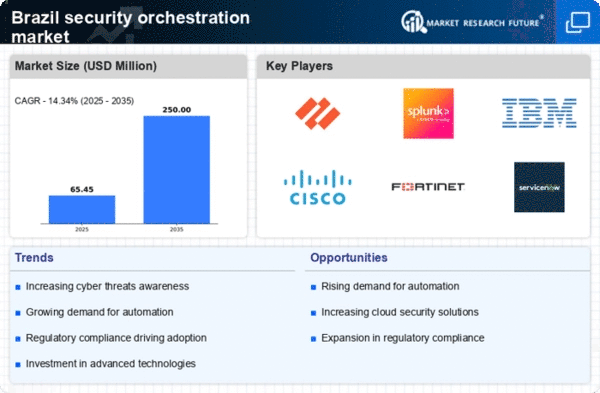Rising Cyber Threat Landscape
The increasing frequency and sophistication of cyber threats in Brazil is a primary driver for the security orchestration market. Organizations are facing a surge in ransomware attacks, phishing schemes, and data breaches, which necessitate robust security measures. According to recent data, Brazil has experienced a 30% rise in cyber incidents over the past year, prompting businesses to invest in security orchestration solutions. These solutions enable organizations to automate responses to threats, thereby reducing response times and minimizing potential damage. As the threat landscape evolves, the demand for integrated security orchestration tools that can provide real-time threat intelligence and incident response capabilities is likely to grow, further propelling the market forward.
Growing Demand for Operational Efficiency
Organizations in Brazil are increasingly recognizing the need for operational efficiency in their security operations. The complexity of managing multiple security tools and processes can lead to inefficiencies and increased operational costs. As a result, there is a growing demand for security orchestration solutions that can unify disparate security technologies and automate workflows. This trend is expected to drive the security orchestration market, with estimates suggesting a potential market growth of 20% over the next few years. By leveraging orchestration tools, organizations can enhance their incident response capabilities, reduce manual intervention, and optimize resource allocation, ultimately leading to improved security outcomes and cost savings.
Increased Regulatory Compliance Requirements
Brazil's regulatory environment is becoming increasingly stringent, particularly concerning data protection and privacy laws. The implementation of the General Data Protection Law (LGPD) has heightened the need for organizations to ensure compliance with data handling and security protocols. This regulatory pressure is driving the security orchestration market as companies seek solutions that can help them automate compliance processes and maintain adherence to legal standards. The market is expected to see a growth rate of approximately 25% as organizations invest in orchestration tools that facilitate compliance reporting and risk management. By integrating security orchestration solutions, businesses can streamline their compliance efforts, thereby reducing the risk of penalties and enhancing their overall security posture.
Shift Towards Cloud-Based Security Solutions
The transition to cloud-based infrastructures is reshaping the security landscape in Brazil. This shift is influencing the security orchestration market. As more organizations migrate their operations to the cloud, there is a pressing need for security solutions that can effectively protect cloud environments. Security orchestration tools are increasingly being adopted to provide visibility and control over cloud security incidents. This shift is likely to contribute to a market growth rate of around 22% as organizations seek to integrate their cloud security measures with existing on-premises solutions. By employing orchestration strategies, businesses can ensure a cohesive security posture across hybrid environments, addressing vulnerabilities that may arise from cloud adoption.
Emergence of Advanced Threat Detection Technologies
The emergence of advanced threat detection technologies, such as behavioral analytics and threat intelligence platforms, is significantly impacting the security orchestration market in Brazil. These technologies enable organizations to identify and respond to threats more effectively, thereby enhancing their overall security posture. As businesses increasingly adopt these advanced solutions, the demand for security orchestration tools that can integrate with these technologies is likely to rise. The market is projected to grow by approximately 18% as organizations seek to leverage orchestration capabilities to streamline threat detection and response processes. By integrating advanced detection technologies with orchestration solutions, organizations can improve their ability to mitigate risks and respond to incidents in a timely manner.
















